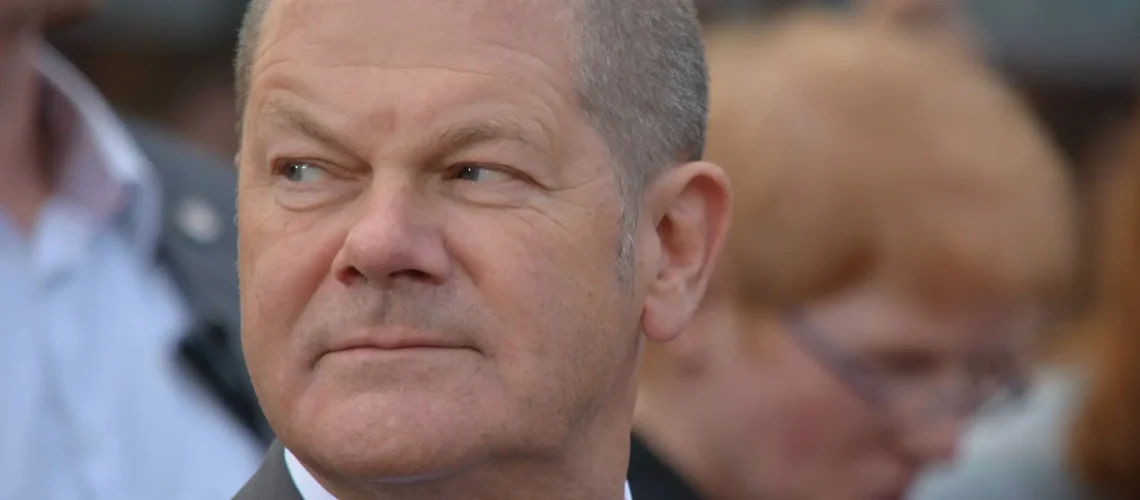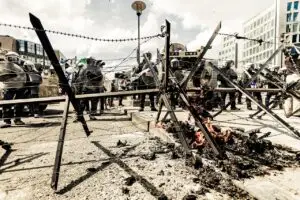The traffic light coalition has failed due to FDP chairman Christian Lindner and his lack of flexibility and uncompromising stance. Chancellor Olaf Scholz holds a press conference and, somehow proudly, announces that he has dismissed Lindner, causing the coalition to collapse. Now, as the fifth chancellor in Germany’s history, he is posing the question of confidence. He comes across like a defiant child, blaming others. Yet he has failed as a leader and, once again, has not managed to keep his team together. On January 15th, the vote of confidence will take place, and at the end of March, Germany will hold elections.
The chancellor looks ahead and seeks to align with the CDU/CSU. This points once again to an impending grand coalition. One thing is certain: In the current climate, many voters will turn to the right-wing AfD and the somewhat left-leaning BSW. The established parties will lose and might just barely manage to form a government—if at all. And then? It will be difficult with a Chancellor Friedrich Merz and an inexperienced but loud opposition.
Right now, we need strong leadership and a clear direction. Chancellor Scholz himself outlined in his speech last night the challenges we are currently facing and those still ahead. German companies are no longer in demand or are being hampered by punitive tariffs and state subsidies for competitors. Our products are too expensive and no longer as esteemed as they once were. “Made in Germany” has lost its good reputation, not to mention the lack of innovation.
German workers are still living in a long-gone good era and demand conditions that few employers can afford. Where is the “Let’s get to work!” attitude from the past? Where are the Germans who roll up their sleeves, scoff at work-life balance, and work 24/7? One thing is certain: With the current attitude, we won’t get any further and will lose to the new players. They are enjoying their newfound prosperity and are stepping on the gas.
The Role of the Media
And how do the media contribute to this situation? Polarizing reporting and algorithmic filter bubbles in social media reinforce extreme positions. Many people distrust traditional media, further affecting public opinion and political discourse. Instead of providing objective information, emotions are stirred, and divisions are deepened.
Importance of Civil Society
Where is civil society? Citizen initiatives, NGOs, and activists are responding to the current political situation, but is that enough? We need to teach democratic values and media literacy in schools to counter populist tendencies. Democracy education must not be a foreign concept. It’s time for all of us to become more engaged.
European Perspective
Political instability in Germany affects the European Union as a whole. Germany threatens to lose its role as a stabilizing force in Europe. The growing tension between national interests and European integration presents us with new challenges. Do we really want to allow nationalism to gain the upper hand?
Economic Challenges
Globalization and digitization are rapidly changing the global economy, and Germany is lagging behind. We must invest in innovation and technology to remain competitive. The shortage of skilled workers and an outdated education system only exacerbate the problem. Where is the courage to embrace change?
Social Inequality
The gap between rich and poor is widening. Social tensions due to economic inequality massively influence the political landscape. Rising rents and living costs contribute to dissatisfaction among the population. If we do not address these problems, we will lose social peace.
Climate Change and Environmental Policy
And then there’s climate change. Despite other pressing problems, it must not be pushed into the background. A green transformation could offer opportunities for the German economy, but we must finally act. Otherwise, we will soon face even greater challenges.
Migration and Integration
We must reckon with future waves of refugees, whether from Ukraine or other crisis regions. How do we intend to meet these challenges? Integration requires more than just good intentions. It needs concrete measures and the will to truly integrate people.
International Relations
Germany’s role on the world stage is at stake. How should we position ourselves in a world where autocratic states are gaining strength? Relations with the USA and China are more strained than ever. Strategies in dealing with these two superpowers are urgently needed. We cannot afford to act without a plan.
Digital Sovereignty
In an increasingly digital world, we must take data protection and cybersecurity seriously. The expansion of digital infrastructures like 5G and broadband internet is long overdue. Germany must not become a digital developing country.
Education and Research
Where are the investments in education? Research and development are keys to Germany’s future viability. Lifelong learning must be more than just a buzzword. Our workforce must be able to adapt to new technologies and labor market requirements.
The Same Mistakes, the Same Actors
The reality is that the same party constellation that brought Germany into this situation is now coming back to power and cannot offer solutions. Somehow, it’s now too late, and the cart is firmly stuck. We’ll only get it out of the mud if we finally roll up our sleeves and work together. But that doesn’t quite fit with our demands and the much-invoked work-life balance, does it?
The Responsibility of the Traffic Light Coalition
All participants of the traffic light coalition are acting irresponsibly. Aside from domestic political problems in Germany: One day after Donald Trump was elected President of the USA, they are rendering Germany a non-operational state in the EU for at least a year. Right now, we need a strong Germany and an assertive chancellor at the helm to prepare the EU for Trump’s punitive tariffs and the withdrawal of US troops. There is no talk of preparation here. One could have long prepared for this scenario but preferred to hope that Trump wouldn’t win re-election.
Ukraine and the Upcoming Challenges
And what about Ukraine? The USA has been the largest supporter so far, with over 75 billion US dollars[^1], and if Trump follows through on what he announced during the campaign, these expenditures will be drastically reduced. Should we then leave Ukraine to fend for itself or step in as Europe (with what money)? In any case, we must already expect a new wave of war refugees from Ukraine. All this poses great challenges for Germany and the EU.
We Must Act NOW
It’s time we wake up. We must pull together as a society and tackle the challenges jointly. That means leaving our comfort zone and being willing to make sacrifices. We need to roll up our sleeves and get to work instead of just complaining.
Conclusion
The traffic light coalition must go. Immediately. New elections must be held as soon as possible. We should never again give all those involved in this debacle a chance at an important political office. They have, excuse my language, messed it up!
[^1]: Source: According to the Kiel Institute for the World Economy, the USA has provided over 75 billion US dollars in military, financial, and humanitarian aid to Ukraine by mid-2023.
Photo: Franz P. Sauerteig via Pixabay






